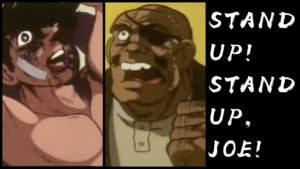Let’s learn Japanese with Rei Ayanami’s quote from Neon Genesis Evangelion (Shin Seiki Evangerion).
CONTENTS
Video
Rei Ayanami’s Quote
Japanese: あなたは死なないわ、私が守るもの。
Romaji: anata wa shinanai wa, watashi ga mamoru mono.
English: You won’t die, because I will protect you.
Analysis
あなた means “you” used toward someone in a lower status or equal in a polite manner. In this scene, Rei is speaking to Shinji, a classmate and coworker as Eva pilots for NERV.
は indicates that she is going to talk about あなた.
死なない means “won’t die”.
わ adds feminine flavour to the sentence which is often used in anime. In a real conversation, it can be replaced with よ which sounds more convincing. If you want to make a statement more declarative and decisive, you can just say あなたは死なない without any sentence ending particles.
私 means “I” commonly used by females, but in a formal situation, males use 私 as well.
守る means “protect”.
が is used when the speaker emphasises what comes before, which is 私 here. So Rei is emphasising that SHE is the one who will protect Shinji.
もの meaning “because” is used to give a good reason for what you do or what you say. It’s usually used by females or children. When you hear もの you will probably think of 物 meaning “a thing” or 者 meaning “a person” but this もの is a conjunction so It’s always written in hiragana. In colloquial speech, it’s often simplified to もん which sounds more childish. Here are some examples.
The clause with もの can be first followed by the main clause so 私が守るもの、あなたは死なないわ。meaning “I will protect you so you won’t die”. It depends on which sentence you want to emphasise. With the Japanese grammar structure, the important information comes at the end of the sentence so in this case, the emphasis is on the second clause “YOU WON’T DIE”.
So あなたは死なないわ、私が守るもの means “You won’t die, BECAUSE I WILL PROTECT YOU”. Rei is indicating her strong will that she is going to protect Shinji.
Examples
が (used when the speaker emphasises what comes before)
レストランは私が予約しておくよ。
resutoran wa watashi ga yoyaku shite oku yo.
I will book the restaurant.
全部あんたが悪いんだよ。
zenbu anta ga waruinda yo.
It’s all YOUR fault.
そうだ。僕がキラだ。
sō da. boku ga kira da.
That’s right. I am Kira. (It is ME who is Kira)
もの/もん (“because” used to give a good reason for what you do or what you say)
こんなに高い服買えないよ、お金ないもん。
konna ni takai fuku kaenai yo. okane nai mon.
I can’t buy such expensive clothes, because I don’t have money.
どうして電話くれないの? – だって時間がないんだもん。
dōshite denwa kurenai no? – datte jikan ga nainda mon.
Why don’t you give me a call? – Because I don’t have time.
てるてる坊主作ったもん、明日はきっと晴れるよ。
teru teru bōzu tsukutta mon, ashita wa kitto hareru yo.
I made a teru teru bōzu so it will be sunny tomorrow.
*Teru teru bōzu is a doll made out of white paper or cloth. It is Japanese custom to hang this doll outside of the window so as to bring good weather and stop or prevent a rainy day.
もの/もん + ね or もの/もん + な is used when you describes a good reason with expression of admiration, compliment, surprise, etc. In this usage, males use もの/もん as well.
今日は焼肉を食べに行こう、サッカーの試合よく頑張ったもんな。
kyō wa yakiniku o tabe ni ikō, sakkā no shiai yoku ganbatta mon na.
Let’s go eat yakiniku today, because you played very well at the soccer match.
Support Easy Peasy Japanesey
If you enjoy our content, please consider supporting Easy Peasy Japanesey. Your support will help keep us going. Thank you for your support!


